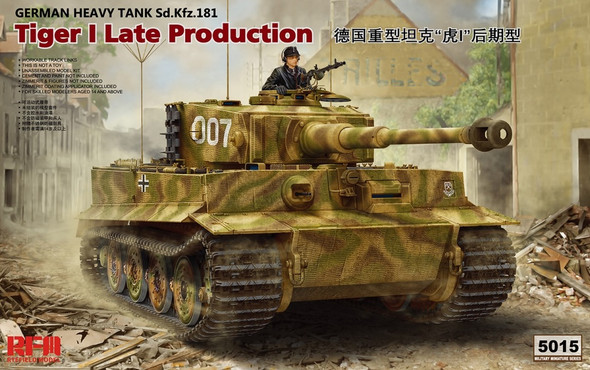Rye Field Model
RYE5010 - Rye Field Model - 1/35 Tiger I; mid production
- SKU:
- RYE5010
- Condition:
- New
- Availability:
- In-Stock items usually Ship within the next business day
- Shipping:
- Calculated at Checkout
Description
RYE5010 - Rye Field Model - 1/35 Tiger I; mid production
The Pz.Kpfw VI (Sd.Kfz.181) Tiger is a German heavy tank from World War II, one of the most famous combat vehicles of that time. The command of the German Panzerwaffe had the idea of creating a heavy tank from the beginning of the war, but the first attempts in the form of the centuries-old Neubaufahrzeuge tank turned out to be unsuccessful. In 1939 and 1940 they were conducted ineffectively, but after the clash with the T-34 and KW-1 on the eastern front, work on the new heavy tank sped up. On April 20, 1942, the prototype of the new tank, under the designation VK 4501 (H), underwent field trials in the presence of Adolf Hitler and was put into mass production shortly after. The first production versions were designated Pz.Kpfw VI Ausf.H1 (later Ausf.E). In the course of production, in the years 1942-1945, the tank was systematically modified by, for example, adding Feifell dust filters, different placement of headlights, modernization of optical equipment, changes to the commander's turret, etc. The drive was provided by a Maybach HL230 P45 12-cylinder carburetor engine with a capacity of 700 HP. The Pz.Kpfw VI tank, although it did not have such a contoured front hull as the T-34 or Pantera, was a heavily armored vehicle (frontal armor up to 120mm), armed with a very effective KwK 36 L / 56 88mm gun, which earned the reputation of being the most effective tank of the Second World War. It was a vehicle much better than the Allied M4 or Churchill and the Soviet T-34/76. He could also easily fight the IS-2 or M-26, surpassing them with the effectiveness of the main armament. On the other hand, the Pz.Kpfw VI had some disadvantages - first of all, it was extremely time-consuming to produce and had a very complicated suspension. In the later period of the war, the quality of the Tiger's armor also deteriorated, which resulted from the lack of access to the molybdenum deposits by the German economy. Despite these drawbacks, the Tiger on the battlefields proved to be a very effective weapon. He successfully fought in Tunisia, the Kursk Arch, Normandy and on the Eastern Front. Technical data: length (with a barrel): 8.45m, width: 3.7m, height: 2.93m, engine power: 700KM, weight: 56.9 t, range (on the road): 100km, maximum speed (on the road) ): 38 km / h, armament: 1 88 mm KwK 36 L / 56 gun, 3 7.92 mm MG 34 machine guns.






